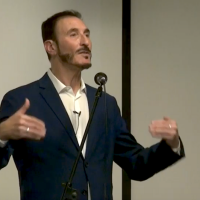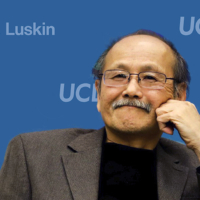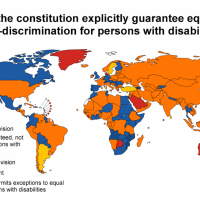Major News: UCLA Luskin Launches Undergraduate Degree The B.A. in Public Affairs combines rigorous methodology with community engagement, connecting the dots between theory and action
By Mary Braswell
The Luskin School’s world-class resources in public policy, social welfare and urban planning will soon be available to a much wider circle of UCLA students.
Beginning in the fall of 2018, the School will offer a Bachelor of Arts in Public Affairs, a major that is unique in the University of California system. A clear public service ethos lies at the heart of the program, which combines critical thinking, social science methodology and deep engagement in the community.
The major will connect the dots between theory and action, said Meredith Phillips, newly named chair of the undergraduate program. Phillips is an associate professor of public policy and sociology who has taught at UCLA for two decades.
“Every class will be focused on societal problems, issues that students care about, and how we can develop reasonable solutions,” Phillips said. “In our classes, we’ll discuss competing values, empirical data and evidence, and different conceptual frameworks for understanding the world. Our students will be developing skills in the service of solving problems, which is really what distinguishes this major from others.”
The impetus for the new program is simple, said UCLA Luskin Dean Gary Segura: “It’s part of our mission.
“This is a land-grant university that was created to serve the public, to serve California,” Segura said. The program, he said, will attract students “who wanted to come to a prestige institution and take that degree back to the communities they came from and create change there.”
“We hope to play a great role in the community service learning opportunities for undergraduates because we already have a lot of experience … with community-based organizations.”
— Laura Abrams,
Social Welfare chair
The B.A. in Public Affairs will provide a wide-ranging education, Phillips said. Students will delve into power politics, microeconomics and human development. They will look at competing social science theories with a critical eye, and master tools for collecting and analyzing data. And they will learn to make written and oral arguments with clarity and conviction.
Unique to the program, she said, is a yearlong capstone project that will immerse seniors in a field and research setting where they can apply their scholarship in the real world.
“The students will be embedded in these organizations, learning from staff and clients about what’s going well, what’s not, and thinking about how to do things even better,” said Phillips, who has co-founded two educational nonprofits.
“They will apply the skills they’ve learned in our classes to those experiences. And what they’re learning on the ground will undoubtedly turn out to be quite informative and will change how they think about what they’re learning in the classroom,” she said.
The emphasis on service learning is what drew UCLA freshman Leyla Solis to explore the Public Affairs B.A.
“All throughout high school, I did a lot of field work in areas I was passionate about,” said Solis, who attended a Northeast Los Angeles charter school that encouraged political engagement. Before coming to UCLA, Solis advocated at the United Nations for the rights of indigenous people, and developed a keen interest in effective governance and environmental law.
A political science major, Solis had been considering the Luskin School’s minor offerings and even looking ahead to a graduate degree. Now she is mulling whether to go for a double major.
“What the people in the Public Affairs Department are doing is not just studying it but going out and experiencing it firsthand,” said Solis, who mentors students from her charter school and tutors low-income children at Santa Monica’s Virginia Avenue Park.
“This is a real opportunity for us to give back to the undergraduate community, to include them in our mission as a school to improve the performance of government and nonprofits.”
— J.R. DeShazo,
Public Policy chair
No other campus in the UC system offers a public affairs bachelor’s degree that draws from the three fields UCLA Luskin is known for: public policy, social welfare and urban planning. Faculty from each department were instrumental in developing the major, making it a true multidisciplinary partnership, Phillips said.
Creation of the major had been in the works for several years, in response to rising student demand. The Luskin School’s current undergraduate courses draw around 1,500 students a year, and its minor programs are among the most popular at UCLA, said the School’s undergraduate advisor, Stan Paul.
Last year, UCLA Luskin faculty voted unanimously to proceed with the undergraduate major. Jocelyn Guihama MPP ’03, deputy director of the Institute on Inequality and Democracy, helped turn this aspiration into reality, shepherding the effort through every stage. UCLA’s Academic Senate gave final approval on April 19, 2018, and the first of an expected 600 students will enter the major this fall, though many more are expected to take courses offered as part of the major.
Students interested in learning more about the major can visit the UCLA Luskin site or email the department at undergraduateinfo@luskin.ucla.edu.
The creation of an undergraduate major at a UCLA professional school is a rare occurrence, Segura said. “It represents a substantial addition to the undergraduate offerings at UCLA, and we think it’s going to be broadly attractive to a whole swath of incoming young people,” he said.
The B.A. in Public Affairs is just one sign of “a new infusion of energy” under Segura, said Meyer Luskin, who, along with his wife, Renee, is the School’s major benefactor and namesake. “I think he’s going to do a lot of outstanding projects for the community and the School, and I’m very enthused about our future.”
“I expect so much energy and commitment coming from our students in the undergrad major. That is going to have tremendous ripple effects in what we teach in our graduate programs.”
— Vinit Mukhija,
Urban Planning chair
The new major comes at a time when a growing number of students are seeking the scholarship and training to effect social change.
“These young people are not simply resisting political and social forces with which they disagree — they’re also resisting knowledge-free policymaking,” Segura said of the spreading youth movement on such issues as gun violence, Black Lives Matter and immigration reform.
“They want to be informed by facts. What we do at Luskin is provide them with the infrastructure to think analytically, with enough training so that they can solve the problems they’ve identified as important to their generation,” he said.
Creation of the major greatly expands undergraduate access to UCLA Luskin’s faculty and resources, and it will also benefit the entire School, Segura said.
“There will certainly be an infusion of energy that only undergraduates can bring. All of a sudden we’re going to have 600 change agents running around the building who are youthful and energized,” Segura said.
In addition, the hiring of new faculty members to support the expansion of class offerings has also opened up avenues for graduate research, he said, and master’s and Ph.D. students in UCLA Luskin’s other degree programs will gain access to teaching assistantships and other leadership roles.
“I think from a scholarly perspective, from a resources perspective, from an experience perspective, it’s a big, big win for the School,” Segura said.








Leave a Reply
Want to join the discussion?Feel free to contribute!